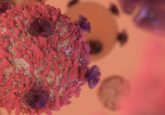Novel personalized approach for lung cancer treatment holds promise

A study published recently in Cancer Cell demonstrates that different types of tumors within small cell lung cancer (SCLC) are visually and behaviorally distinct. Scientists from Huntsman Cancer Institute, University of Utah (UT, USA) analyzed the distinct tumor types and identified – for one tumor type – a targeted drug treatment combination.
Study leader Trudy Oliver (University of Utah) explained: “Currently when SCLC patients come in, there is no genetic testing for them. They’re just diagnosed with small cell and they are all treated basically the same way. But our research showed small cell tumors do not all act alike. That becomes very important in how a patient is treated.”
Researchers created a small cell tumor subgroup replica utilizing mice, termed C-MYC. The team observed that these tumors appeared visually different: “They’re much more aggressive. They grow faster and they spread faster. And most importantly, they respond differently to therapy,” commented Oliver.
Through observing differences among tumor subtypes, a more personalized treatment approach can be applied, compared to the blanket treatment of chemotherapy. Chemotherapy is approximately 80% effective, but tumors can develop resistance.
In order to identify effective drugs for this type of small cell tumor scientists from the University of Utah collaborated with a team from the University of Cologne (Germany). This resulted in the discovery of a drug – Aurora kinase inhibitor – which led to mice surviving twice a long when used in conjunction with chemotherapy. Oliver reported, “We have some mice that really had extended survival. If these observations could be translated to people, this could be a significant breakthrough for patients with SCLC.”
She concluded: “Historically when you would test a drug in SCLC, almost everything failed. You’d maybe have 10 or 20% of people respond and you didn’t know why those did. So now that we have a new appreciation for the different molecular types of tumors, we might realize, ‘Oh, 100% of this tumor subgroup actually responded – it just happened to be only 20% of the whole.'”
Future research will continue to explore the importance of genetic testing in order to identify the correct treatment for types of SCLC. Furthermore, investigations will explore the use the genetic testing in other cancers, such as brain, pancreatic, gastrointestinal and prostate.
Sources: Mollaoglu G, Guthrie MR, Böhm S et al. Cancer Cell. MYC Drives Progression of Small Cell Lung Cancer to a Variant Neuroendocrine Subtype with Vulnerability to Aurora Kinase Inhibition doi.org/10.1016/j.ccell.2016.12.005 (2017) (Epub ahead of print); www.eurekalert.org/pub_releases/2017-01/uouh-hci010517.php



